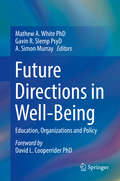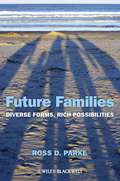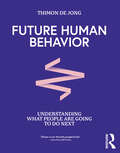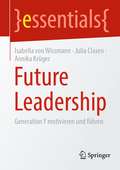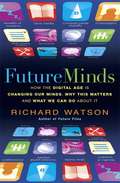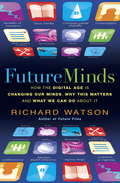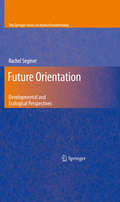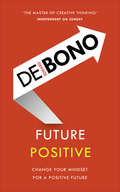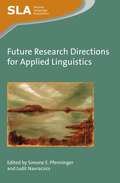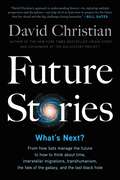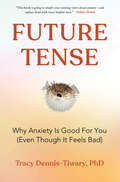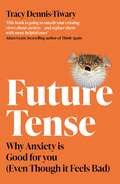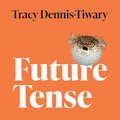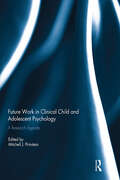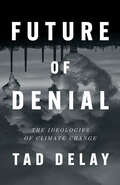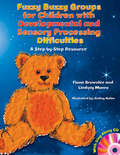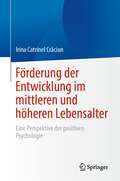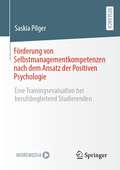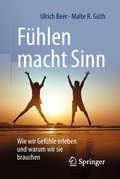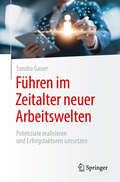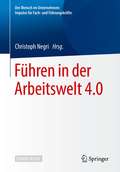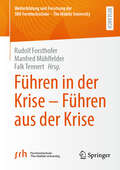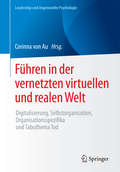- Table View
- List View
Future Directions in Well-Being
by A. Simon Murray Mathew A White Gavin R. SlempThis book is a collection of essays advancing the discourse in well-being science, authored by key thought leaders in positive psychology and its variants, including positive education, character education, and positive organizational scholarship. The authors address topics such as the next big ideas in well-being research and practice, potential strategies , as well as current gaps and limitations of the field. This book will be of particular interest for policy makers, educators and practitioners, as well as researchers.
Future Families: Diverse Forms, Rich Possibilities
by Ross D. ParkeFuture Families explores the variety of family forms which characterize our contemporary culture, while addressing the implications of these increasingly diverse family units on child development. Reveals the diversity of new family forms based on the most current research on fathers, same-gender parents, new reproductive technologies, and immigrant families Illustrates that children and adults can thrive in a variety of non-traditional family forms Shows the interrelatedness of new trends in family organization through the common themes of embedded families and caregiving in community and cultural contexts Features an interdisciplinary approach, drawing from works in areas that include child development, family studies, sociology, cross-cultural scholarship, ethnic studies, biology, neuroscience, anthropology and even architecture Sets an agenda for future research in the area of families by identifying important gaps in our knowledge about families and parenting
Future Human Behavior: Understanding What People Are Going To Do Next
by Thimon De JongThe world continues to develop at an astonishing speed – socially and technologically. Human behavior is continually influenced by this ever-changing environment. Is it possible to predict what those new behaviors will be? And what are their implications for our future societies? Thimon de Jong’s Future Human Behavior is a unique and accessible examination of our thrilling, challenging and unpredictable world and how we respond, react and shape it. Using insightful and original examples aligned with pertinent analysis, the author takes the reader on a compelling journey through future behavioral dynamics. He engages with a wide variety of topics, from digitalisation to trust, from ethics to mental health. Future Human Behavior is your inspirational guide to a number of possible futures, and the book you need to be ready for them all.
Future Leadership: Generation Y motivieren und führen (essentials)
by Julia Clasen Isabella von Wissmann Annika KrügerWie wollen Mitglieder der Generation Y geführt werden? Auf Basis wissenschaftlicher Erkenntnisse liefert dieses essential Führungskräften, Beratern und Coaches praktische Handlungsempfehlungen und effektive Methoden für die erfolgreiche Führung von Nachwuchskräften. Anhand von aktuellen Studien werden Bedürfnisse und Erwartungen der Ypsiloner an Führung identifiziert und Erfolgsfaktoren zur Führung dieser Generation abgeleitet. Im Überblick werden drei zentrale Methoden agiler Führung vorgestellt: Scrum, Design Thinking und OKR. Resümierend können Ansätze des agilen Managements zur effektiven Führung von Mitarbeitern der Generation Y als erfolgversprechend bewertet werden.
Future Minds: How the Digital Age Is Changing Our Minds, Why This Matters, and What We Can Do About It
by Richard WatsonWe are on the cusp of a revolution. Mobile phones, computers and iPods are commonplace in hundreds of millions of households worldwide, influencing how we think and shaping how we interact. In the future, smart machines will compete with clever people for employment and even human affection. We are shifting to a world where knowledge will be automated and people will be rewarded instead as conceptual and creative thinkers. Hence being able to think and act in ways that machines cannot will become vital. Ideas are the currency of this new economy and curiosity and imagination are among the key raw materials. But what happens to the rigour of our thinking in a world where we never really sit still or completely switch off? What are some of the unexpected consequences of digital information on the 100 billion cells and quadrillion connections inside our brains? Future Minds illustrates how to maximise the potential of digital technology and minimise its greatest downside, addressing the future of thinking and how we can ensure that we unleash the extraordinary potential of the human mind. In this absorbing new book, discover all about: the sex life of ideas; the rise of the screenager; generations, gender and geography; delving deep inside your head; how to clear a blocked brain; why clever people make dumb mistakes; why we are so afraid of doing nothing; what we can do to reclaim our brains.
Future Minds: How the Digital Age Is Changing Our Minds, Why This Matters, and What We Can Do About It
by Richard WatsonDrawing on the latest research, this book looks at the ways that screen culture is shaping the future and changing the way we think. Future Minds asks: are we becoming addicted to data and how do we go about starting a digital diet, urgently? You'll find thought-provoking and practical suggestions about reclaiming the space and time to think deeply.
Future Orientation
by Rachel SeginerWhere am I going? What do I want to do with my life? Such questions are typical of--even essential to--adolescence and continue to influence individuals throughout their lifetimes. And although human beings are capable of anticipating future events even as infants, the teen years are the peak period for weighing options and setting long-range goals. Future Orientation: Development and Ecological Perspectives synthesizes a wealth of theory and empirical data to explore future thinking as both a developmental process and an individual one. Starting with its origins in childhood, the book identifies the forces that affect this evolution, from early interactions with parents to personality traits and self-processes. Adolescents' future orientation is analyzed by its influences--a complex network of gender expectations, family and peer relationships, and cultural variables--and is, in turn, linked to developmental outcomes at school, capacity for intimacy, and adjustment in emerging adulthood and in adult life. This unique volume: Examines future orientation as an aspect of positive psychology, focusing on the stages of preadolescence, adolescence, and emerging adulthood. Relates future orientation with other psychological constructs relevant to this age group, including identity and self-esteem. Offers ecological and developmental perspectives to explore the effects of family members and peer groups on future thinking. Compares adolescent future thinking across cultures and discusses the roles of gender and gender constructs in future orientation. Complements developmental and educational psychology as well as counseling and parental guidance courses. Given the current climate of rapid social change, Future Orientation is an invaluable reading for researchers, clinicians, and practitioners, including child and school psychologists, psychiatrists, counselors, social workers, and others who work with young people during this critical juncture.
Future Positive
by Edward de Bono‘Of one thing in life we can be sure. The quality of our life in the future will depend on the quality of our thinking.’Why are we so prone to be negative? And how can we become more positive, both as individuals and as a society? The answer lies in the way we think. The key to positive thinking is developing new concepts, whether this means coming up with a brand new idea or just looking at an existing one in a new light. If we make a deliberate and positive effort to change our thinking we can secure a positive future, and we can harness the focused power of human thinking by releasing it from its pettiness. Edward the Bono is the Nobel Prize nominated father of creative thinking and the master of training the mind to think the right way. He wrote the multi-million copy bestseller Six Thinking Hats and many other revolutionary works on how to think. This classic work was first published in 1979, and since then our belief in the power of positive thinking has only become stronger.
Future Research Directions for Applied Linguistics
by Judit Navracsics Simone E. PfenningerThis edited volume provides an overview of current thinking and directions for further research in applied linguistics by bringing together in a single volume a range of perspectives regarding original research agendas and innovative methodological approaches. It focuses not only on the challenges that applied linguistics researchers have been facing in recent years but also on producing workable and productive research designs and on identifying ways of how alternatives to conventional research methodologies can be used. Discussions featured in the volume include the so-called ‘Bilingual Advantage’ in psycho- and neurolinguistics; the optimal starting age debate in foreign language learning; the growing interest among applied linguists in more nuanced and more complex (statistical) data analysis and the priority given to more descriptive and social approaches to linguistics rather than to theorising. The collection will be a useful reference and stimulus for students, researchers and professionals working in the areas of applied linguistics, psycholinguistics, second language acquisition and second language education.
Future Stories: What's Next?
by David ChristianThe New York Times bestselling author of Origin Story, who Bill Gates has &“long been a fan of,&” turns his attention to the future of humanity — and how we think about it — in this ambitious book. The future is uncertain, a bit spooky, possibly dangerous, maybe wonderful. We cope with this never-ending uncertainty by telling stories about the future, future stories. How do we construct those stories? Where is the future, the place where we set those stories? Can we trust our future stories? And what sort of futures do they show us? This book is about future stories and future thinking, about how we prepare for the future. Think of it as a sort of User&’s Guide to the Future. We all need such a guide because the future is where we will spend the rest of our lives. David Christian, historian and author of Origin Story, is renowned for pioneering the emerging discipline of Big History, which surveys the whole of the past. But with Future Stories, he casts his sharp analytical eye forward, offering an introduction to the strange world of the future, and a guide to what we think we know about it at all scales, from the individual to the cosmological. Christian consults theologians, philosophers, scientists, statisticians, and scholars from a huge range of places and times as he explores how we prepare for uncertain futures, including the future of human evolution, artificial intelligence, interstellar travel, and more. By linking the study of the past much more closely to the study of the future, we can begin to imagine what the world will look like in a hundred years and consider solutions to the biggest challenges facing us all.
Future Tense: Why Anxiety Is Good for You (Even Though It Feels Bad)
by Tracy Dennis-TiwaryA psychologist confronts our pervasive misunderstanding of anxiety and presents a powerful new framework for reimagining and reclaiming the confounding emotion as the advantage it evolved to be.We taught people that anxiety is dangerous and damaging, and that the solution to its pain is to eradicate it like we do any disease—prevent it, avoid it, and stamp it out at all costs. Yet cutting-edge therapies, hundreds of self-help books, and a panoply of medications have failed to keep debilitating anxiety at bay. A third of us will struggle with anxiety disorders in our lifetime and rates in children and adults continue to skyrocket.That’s because the anxiety-as-disease story is false—and it’s harming us.In this radical reinterpretation, Dr. Tracy Dennis-Tiwary argues that anxiety is an evolved advantage that protects us and strengthens our creative and productive powers. Although it’s related to stress and fear, it’s uniquely valuable—allowing us to imagine the uncertain future and compelling us to make that future better. That’s why anxiety is inextricably linked to hope.By distilling the latest research in psychology and neuroscience, including her own, combining it with real-world stories and personal narrative, Dennis-Tiwary shows how we can acknowledge the discomfort of anxiety and see it as a tool, rather than something to be feared and reviled. Detailing the terrible cost of our misunderstanding of anxiety, while celebrating the lives of people who harness it to their advantage, she argues that we can—and must—learn to be anxious in the right way.Future Tense blazes the way for a paradigm shift in how we relate to and understand anxiety in our day-to-day lives—a fresh set of beliefs and insights that allow us to explore and leverage even very distressing anxiety rather than to be overwhelmed by it. Through this new prism of thinking, even anxiety disorders can be alleviated. Achieving a new mindset will not fix anxiety itself—because the emotion of anxiety is not broken; the way we cope with it is. By challenging our long-held assumptions about anxiety, this book provides a concrete framework for how to reclaim it for what it has always been—a gift rather than a curse, and a source of inner strength, joy, and ingenuity.
Future Tense: Why Anxiety is Good for You (Even Though it Feels Bad)
by Tracy Dennis-TiwaryA psychologist confronts our pervasive misunderstanding of anxiety and presents a powerful new framework for reimagining and reclaiming the confounding emotion as the advantage it evolved to be.We are taught that anxiety is dangerous and damaging, and that the solution to its pain is to eradicate it like we do any disease. Yet cutting-edge therapies, hundreds of self-help books, and a panoply of medications have failed to keep debilitating anxiety at bay.That's because the anxiety-as-disease story is false - and it's harming us.In this radical reinterpretation, Dr Tracy Dennis-Tiwary distils the latest research in psychology and neuroscience, combined with real-world stories and personal narrative, to argue that the discomfort of anxiety is a tool, rather than something to be stamped out at all costs. Detailing the terrible cost of our misunderstanding of anxiety, while celebrating the lives of people who harness it to their advantage, FUTURE TENSE reveals how we can live and grow with anxiety.
Future Tense: Why Anxiety is Good for You (Even Though it Feels Bad)
by Tracy Dennis-TiwaryA psychologist confronts our pervasive misunderstanding of anxiety and presents a powerful new framework for reimagining and reclaiming the confounding emotion as the advantage it evolved to be.We are taught that anxiety is dangerous and damaging, and that the solution to its pain is to eradicate it like we do any disease. Yet cutting-edge therapies, hundreds of self-help books, and a panoply of medications have failed to keep debilitating anxiety at bay.That's because the anxiety-as-disease story is false - and it's harming us.In this radical reinterpretation, Dr Tracy Dennis-Tiwary distils the latest research in psychology and neuroscience, combined with real-world stories and personal narrative, to argue that the discomfort of anxiety is a tool, rather than something to be stamped out at all costs. Detailing the terrible cost of our misunderstanding of anxiety, while celebrating the lives of people who harness it to their advantage, FUTURE TENSE reveals how we can live and grow with anxiety.
Future Time Perspective and Motivation: Theory and Research Method
by Joseph NuttinFirst published in 1985. Routledge is an imprint of Taylor & Francis, an informa company.
Future Work in Clinical Child and Adolescent Psychology: A research agenda
by Mitchell J. PrinsteinPreeminent clinical child and adolescent psychological scientists offer an agenda for future research in this compendium of thought pieces. On a wide range of topics including ADHD, depression, self-injury, emotion regulation, conduct problems, addictions, clinical assessment and therapy, and many more, scientists review the current state of the literature and offer specific recommendations for what investigators next need to tackle to reduce mental illness among youth. Chapters include a discussion of theories and methods in clinical child and adolescent psychology, current funding priorities, and the intersection of traditional clinical psychology research with the burgeoning field of psychological neuroscience. This book is an essential resource for classes on clinical child and adolescent psychopathology and treatment. It also provides a unique guide for undergraduate and early graduate students who are determining how to start their research careers in the field. All of the chapters in this book were originally published as articles in the Journal of Clinical Child and Adolescent Psychology.
Future of Denial: The Ideologies of Climate Change
by Tad DeLay"Tad DeLay is one of the most important and disquieting theorists of consciousness and politics writing today. His work is indispensable."—China Miéville, author of OctoberCapitalism is an ecocidal engine constantly regenerating climate change denialThe age of denial is over, we are told. Yet emissions continue to rise while gimmicks, graft, and green- washing distract the public from the climate violence suffered by the vulnerable. This timely, interdisciplinary contribution to the environmental humanities draws on the latest climatology, the first shoots of an energy transition, critical theory, Earth&’s paleoclimate history, and trends in border violence to answer the most pressing question of our age: Why do we continue to squander the short time we have left?The symptoms suggest society&’s inability to adjust is profound. Near Portland, militias incapable of accepting that the world is warming respond to a wildfire by hunting for imaginary left-wing arsonists. Europe erects nets in the Aegean Sea to capture migrants fleeing drought and war. An airline claims to be carbon neutral thanks to bogus cheap offsets. Drone strikes hit people living along the aridity line. Yes, Exxon knew as early as the 1970s, but the fundamental physics of carbon dioxide warming the Earth was already understood before the American Civil War.Will capitalists ever voluntarily walk away from hundreds of trillions of dollars in fossil fuels unless they are forced to do so? And, if not, who will apply the necessary pressure?
Fuzzy Buzzy Groups for Children with Developmental and Sensory Processing Difficulties
by Fiona Brownlee Lindsay MunroChildren with sensory and cognitive difficulties can struggle to interact with their peers, be easily distracted, and have problems coping with change. Fuzzy Buzzy Groups for Children with Developmental and Sensory Processing Difficulties has been devised to address the needs of children with sensory processing difficulties and development delay in specialist and inclusive settings. This easy-to-follow resource will enable professionals to engage with children in a relaxed and fun way that explores sensory experiences. It contains everything you need to run a Fuzzy Buzzy group: from advice for choosing sensory food and drink and criteria for selecting suitable children, to tips for involving parents in the group and sourcing sensory materials. The authors guide you step-by-step through how to carry out a session, and include photocopiable forms and checklists as well as a sing-along CD containing music to use with the group. This resource will help children not just to explore sensory experiences, but also to learn to share, take turns, listen, interact with their peers and improve their self-esteem. The eight-session programme is ideally suited to children aged 2-5, although this can be adapted to suit individual needs, and is perfect for early years' practitioners, teachers, teaching assistants, family respite carers and other professionals working with young children.
Fármaco
by Almudena SánchezUn testimonio sobre la depresión escrito sin tabúes, con humor y cercanía por una de las voces más especiales de su generación. «Almudena Sánchez hace música con los añicos de ese cristal delicado del que estamos hechos.»Elvira Navarro Este es el relato de una explosión, del momento en que la tristeza dinamitó todas las certezas de la autora y decidió instalarse en su cuerpo. En Fármaco encontraréis un cerebro que quería desaparecer y una escritora que lo agarró y buscó cómos y porqués entre recuerdos, conductos y cavidades. Aquí hay infancia y hay madre, una niñez en escuelas de Mallorca y en campos de Castilla; hay pastillas naranjas que te ponen en pausa y pastillas rojas que te lanzan a la estratosfera; hay sueños, pesadillas y deseos: «ojalá la depresión se quitara desnudándonos, tímidamente y despacio». Y libros. Hay muchos libros, historias para escapar y otras para entender qué pasaba en su cabeza. Aquí la literatura es bálsamo, esperanza y salvación. La crítica ha dicho...«"Este libro es para personas tristes con sentido del humor", escribe Almudena Sánchez. Desde luego, Fármaco no es un texto para personas alegres que carezcan de él. El relato de la depresión se solapa con los recuerdos de infancia a los treinta y tres años. Sánchez es una Charlie Rivel y una Jesucrista Superestar que escribe, con ligereza, sobre un peso insoportable, y nos regala un libro honesto, limpio y maravilloso.»Marta Sanz «Como quien afila una mina de lápiz muy oscura para hacerla punzante y obtiene a la vez virutas de luz, así escribe en este libro Almudena Sanchez. No necesita excederse en la crudeza ni tampoco idealizar, escribe con distancia y temblor, abate cada prejuicio, enciende sombras.»Belén Gopegui «Un libro que se hace al mismo tiempo que la vida. En Fármaco cada símbolo esconde una historia, con su pasado y su presente. En la prosa de Almudena Sánchez, el futuro es la belleza.»Elena Medel Sobre La acústica de los iglús se dijo:«Sánchez salta a la comba contra la desdicha, pero no es un juego. Ella escribe con un esmerado desorden. ¿Con el esmerado desorden de los que intentan qué? Es posible que no envejecer.»Isabel González, El Mundo «Si acaso es posible la quimera de una adolescencia adulta, de una madurez jovial, los relatos de Almudena Sánchez apostarían todo a esa ensoñación, pues en ellos encontramos la mirada única de una narradora que templa el estilo para poner del revés la trama mágica del mundo.»Eñe «Pero su humor no es sólo satírico, sino que emplea la comedia y el absurdo para crear un mundo literario propio, distinto a cualquiera que hayamos leído hasta ahora. En este mundo particular, la narrativa se mezcla con la lírica y se dota de tantos matices que elcrítico literario corre el riesgo de perderse en calificativos.»Ricardo Lladosa, Heraldo de Aragón
Förderung der Entwicklung im mittleren und höheren Lebensalter: Eine Perspektive der positiven Psychologie
by Irina Catrinel CrăciunDieses Handbuch integriert und erörtert eine wachsende Evidenzbasis zur individuellen Entwicklung im mittleren und späten Erwachsenenalter. Das Buch enthält eine umfassende Analyse dessen, was Wachstum in der Lebensmitte und im höheren Alter bedeutet, und zeigt auf, wie verschiedene Entwicklungsbereiche miteinander verwoben sind (d. h. körperliche, kognitive, soziale und emotionale Entwicklung sowie Persönlichkeitsentwicklung). Da die Kluft zwischen Theorie und Praxis immer noch ein Problem in der Entwicklungsforschung darstellt, zielt das Handbuch auch darauf ab, anschauliche Beispiele für Prävention und Intervention aus der Perspektive der positiven Psychologie zu liefern. Diese wurden so ausgewählt, dass sie eine Vielzahl von Themen repräsentieren, die für die individuelle Entwicklung relevant sind und bei denen die Forschung die Praxis beeinflusst, von Glück, Großelternschaft, Liebe und Sexualität bis hin zu Einsamkeit, Depression, Angst, Suizidprävention und Bewältigung des Todes.Dieses Handbuch ist ein unverzichtbares Hilfsmittel für Studenten und Forscher, die in den Bereichen Entwicklungspsychologie, Gesundheitspsychologie, Gerontologie und öffentliche Gesundheit arbeiten. Es ist auch für Praktiker wie Berater, Life Coaches, Psychotherapeuten, Organisationspsychologen, Gesundheitsfachleute, Sozialarbeiter und Planer im Bereich der öffentlichen Gesundheit von Interesse.
Förderung von Selbstmanagementkompetenzen nach dem Ansatz der Positiven Psychologie: Eine Trainingsevaluation bei berufsbegleitend Studierenden
by Saskia PilgerDie Nachfrage nach berufsbegleitenden Studiengängen steigt, da die Studienform Studierenden bessere Chancen für die eigene Karriere bietet. Unternehmen investieren in hochqualifizierte Studierende, um von deren Kompetenzen zu profitieren. Das berufsbegleitende Studium geht jedoch mit einer Dreifachbelastung zwischen Arbeit, Studium und Privatleben für die Studierenden einher. Dies kann, wie empirische Untersuchungen zeigen, zu Erschöpfungszuständen und mentalen Problemen führen. Interventionen der Positiven Psychologie, die Menschen zum Aufblühen bringen, wurden bereits evaluiert und haben sich als wirksam erwiesen. Allerdings wurden für die betrachtete Zielgruppe noch keine positiv-psychologischen Interventionskonzepte mit Fokussierung auf ein reüssierendes Selbstmanagement entwickelt. Daher wurde das Projekt „Study, work and stay positive“ initiiert. Auf der Grundlage von Theorie, empirischer Forschung und zwei qualitativen Vorstudien wurde eine Live-Online-Trainingsintervention entwickelt. Die Evaluationsergebnisse zeigen, dass das Training zu einer Steigerung von Selbstmanagementkompetenzen, Mentaler Stärke, Zufriedenheit, affektivem organisationalen Commitment, selbst eingeschätzter Leistungsfähigkeit sowie einer Verringerung des Stresslevels führt.
Fühlen macht Sinn: Wie wir Gefühle erleben und warum wir sie brauchen
by Ulrich Beer Malte R. GüthGefühle sind die treibende Kraft des Menschen. Kaum vorstellbar, wie sich unser Leben ohne Gefühle gestalten würde. Emotionen üben Einfluss auf unser Denken, beeinflussen unseren Umgang mit anderen Menschen und umgekehrt lernen wir im Laufe des Lebens den Umgang mit Emotionen. Und doch wünschen sich viele ein Leben ohne oft verwirrende Emotionen.Dieses Buch zeigt, wie vitalitätsstiftend Emotionen einerseits sind, andererseits auch der Kontrolle bedürfen. So sind Gefühle immer auch Impulsgeber für unser Verhalten. Oft stehen sie im Konflikt mit dem, was wir uns wünschen oder für vernünftig halten. Durch Texte von Ulrich Beer im Wechsel mit weiteren Kapiteln von Malte R. Güth wird dieser scheinbare Widerspruch aufgeklärt. Mit moderner psychologischer Forschung, zahlreichen lebensnahen Beispielen und fachübergreifender Diskussion lernt der Leser Offenheit gegenüber Emotionen – und inwiefern es das rechte Maß an Kontrolle über sie gibt.
Führen im Zeitalter neuer Arbeitswelten: Potenziale realisieren und Erfolgsfaktoren umsetzen
by Sandra GauerDen Weg zu innovativen Arbeitswelten prägt der Mut, aktuelle Denkmuster zu durchbrechen! In diesem architektur- und wirtschaftspsychologischen Buch tauchen Sie tief in neue Arbeitswelten und die daraus entstehenden Anforderungen an die Führung ein. Es werden die komplexen Herausforderungen der Führung in New Work-Umgebungen ebenso beleuchtet, wie die verborgenen Potenziale. Die Chancen und Risiken unserer physischen, psychischen und digitalen Arbeitswelt in Bezug auf unser Erleben und Verhalten sind in diesem Buch ebenfalls ein wichtiger Bestandteil. Es zeigt auf, wie Menschen neue Arbeitswelten für sich entdecken und wertschöpfend für Ihre Tätigkeiten und Bedürfnisse nutzen können. Anschaulich stellt die Autorin dar, , wie eine transformationale, emotional intelligente Führung die ständigen Veränderungen und neuen Anforderungen erfolgreich meistern und Gesundheit fördern kann. Zudem wirft das Buch einen kritischen Blick auf die aktuellen Strategien zum Workplace Changeund die Ansprüche, die an Führungskräfte gestellt werden. Die zentrale Frage ist unvermeidlich: Was bedeutet „den Menschen in den Mittelpunkt stellen“, und welche Konsequenzen hat es, wenn wir es nicht tun.Zielgruppen: Dieses Buch wendet sich an Führungskräfte, die die Chancen und Potenziale der Führung in modernen Arbeitswelten für sich nutzen wollen. Doch auch für Mitarbeiter und Interessierte bietet es faszinierende Einblicke in die Themen New Work und Leadership. Denn letztendlich erfordert die neue Arbeitswelt das Verständnis und Engagement von jedem Einzelnen von uns.
Führen in der Arbeitswelt 4.0 (Der Mensch im Unternehmen: Impulse für Fach- und Führungskräfte)
by Christoph NegriDieses Praxisbuch bietet einen Überblick über die psychologischen Aspekte der Führung und Entwicklung in der Arbeitswelt 4.0. Es enthält praxisrelevante, augenöffnende Beiträge wie z.B.:Menschen in der Arbeitswelt 4.0Digitale LeadershipTeamentwicklung in der digitalen ArbeitsweltPsychologischen Grundlagen agiler ArbeitsmethodenPersonalentwicklung und Lernen in der Arbeitswelt 4.0Identität in der Arbeitswelt 4.0Design Thinking zur Entwicklung innovativer WeiterbildungenLeistungssteuerung und Selbstregulation als Kernkompetenz in der Arbeitswelt 4.0. Neben realen Best-Practice-Fällen aus verschiedenen Branchen kommen Expertinnen und Experten in Interviews zu Wort, neueste wissenschaftliche Erkenntnisse von aktuellen IAP-Forschungsergebnissen werden für Anwender/innen aufbereitet und relevante, praxisdienliche Hinwiese beschrieben. Praktiker/innen finden in diesem Band Grund- und Anwendungswissen in kompakter und leicht verständlicher Form. Die ZielgruppenFach- und Führungskräfte, Geschäftsführer/-innen, Personalentwickler/-innen, HR-Manager/-innen, Berater/-innen und alle an den Entwicklungen zur Arbeitswelt 4.0 interessierten Personen.Der HerausgeberProf. Dr. Christoph Negri ist Leiter des IAP Institut für Angewandte Psychologie an der ZHAW Zürcher Hochschule für Angewandte Wissenschaften. Seit 2015 führt er am IAP verstärkt neue Entwicklungen im Bereich Lernen und Lehren ein und treibt den digitalen Wandel in Weiterbildung und Dienstleistung voran.
Führen in der Krise – Führen aus der Krise (Weiterbildung und Forschung der SRH Fernhochschule – The Mobile University)
by Manfred Mühlfelder Rudolf Forsthofer Falk TennertDas Ziel dieses Buches ist es, das Thema „Krisenführung“ aus verschiedenen psychologischen Perspektiven zu betrachten. Krisen sind durch drei Merkmale gekennzeichnet: Existenzielle Bedrohung von Menschen, Gruppen und Organisationen Dringlichkeit und Notwendigkeit von Verhaltensänderungen Hohe zeitliche Dynamik, Unvorhersehbarkeit und Agilität der Krisenereignisse Es werden verschiedene Facetten des Führungshandelns in Krisensituationen sowohl aus der Perspektive der Führenden als auch der Geführten beleuchtet und Handlungsempfehlungen für Führungskräfte zur Mitarbeiter- und Teamführung in akuten Krisen abgeleitet.
Führen in der vernetzten virtuellen und realen Welt
by Corinna Von AuDer vorliegende achte Band der Reihe Leadership und Angewandte Psychologie beleuchtet insbesondere den bedeutenden Aspekt der Digitalisierung in der VUCA-Welt, der unter anderem zur Erfordernis einer Selbstorganisation des „lebenden“ Organisationssystems mit seinen wechselseitigen, in nicht linearen Austauschbeziehungen stehenden Organisationsmitgliedern führt. Hierbei wird auch auf bedeutende Organisationsspezifika – wie unter anderem Wissenschaft und öffentliche Verwaltung – sowie auf das Tabuthema „Tod und Trauer“ in Organisationen eingegangen.
